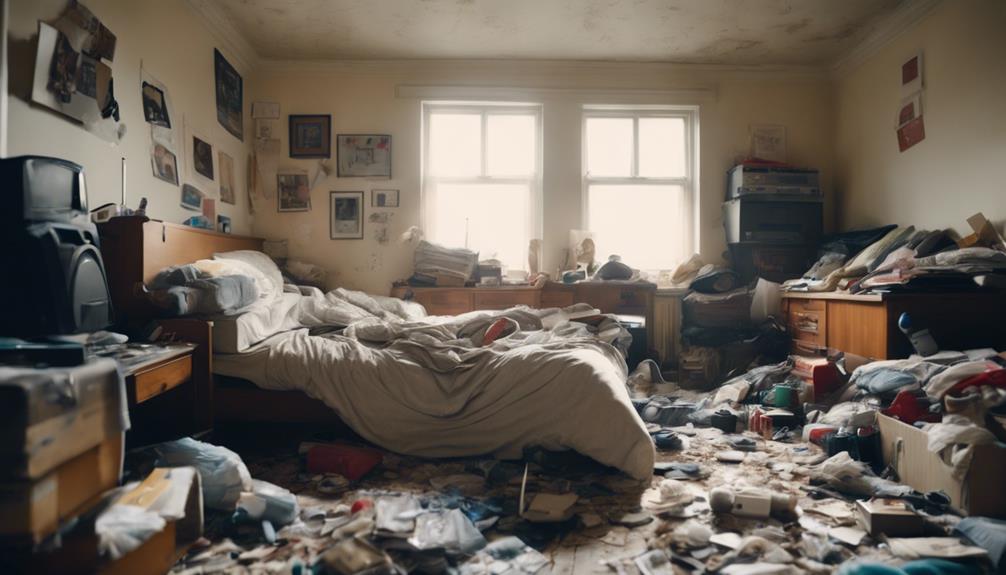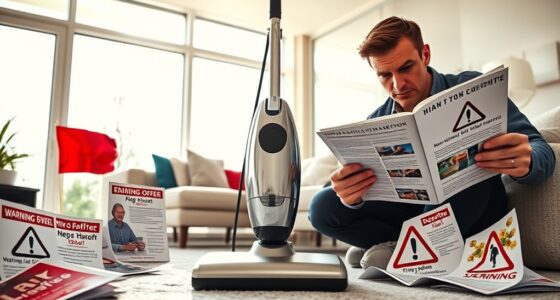You can make your cleaning process easier and reduce stress by making strategic changes to your routine, such as grouping similar tasks, creating a schedule, and organizing your cleaning supplies efficiently. Prioritize tasks effectively by breaking them down into manageable chunks and focusing on important areas first. Allocate realistic timeframes and establish consistent schedules to avoid feeling overwhelmed. By delegating tasks wisely, organizing necessary tools, and decluttering your living space, you will create a stress-free environment. Discover how to create a flexible cleaning plan, maintain a peaceful atmosphere, and more to enhance your cleaning experience.
Key Takeaways
- Divide cleaning tasks into manageable chunks, focusing on critical areas first to maintain motivation and structure.
- Establish a consistent cleaning schedule with realistic timeframes to prevent overwhelm and rushedness.
- Delegate household chores based on strengths and age appropriateness, rotating tasks regularly to track progress.
- Organize essential cleaning tools by type or function, using labeled containers for storage and keeping frequently used tools within reach.
- Reduce unnecessary items to clean and organize, embracing minimalism to save time and energy while creating a cleaner and more spacious environment.
Simplify Your Cleaning Routine
By incorporating a few simple strategies into your daily routine, you can greatly simplify your cleaning routine and make it more manageable. To start, group similar tasks together and create a cleaning schedule for each room to maximize efficiency. This will help you simplify cleaning tasks and make the most of your time.
Additionally, delegate household chores to other members of your household to share the workload and lighten the cleaning burden. This won't only make cleaning more manageable but also foster a sense of teamwork and responsibility.
Furthermore, optimize the organization of your cleaning supplies to streamline the cleaning process and minimize waste. By having everything you need in one place, you'll save time and reduce frustration.
Prioritize Tasks Efficiently
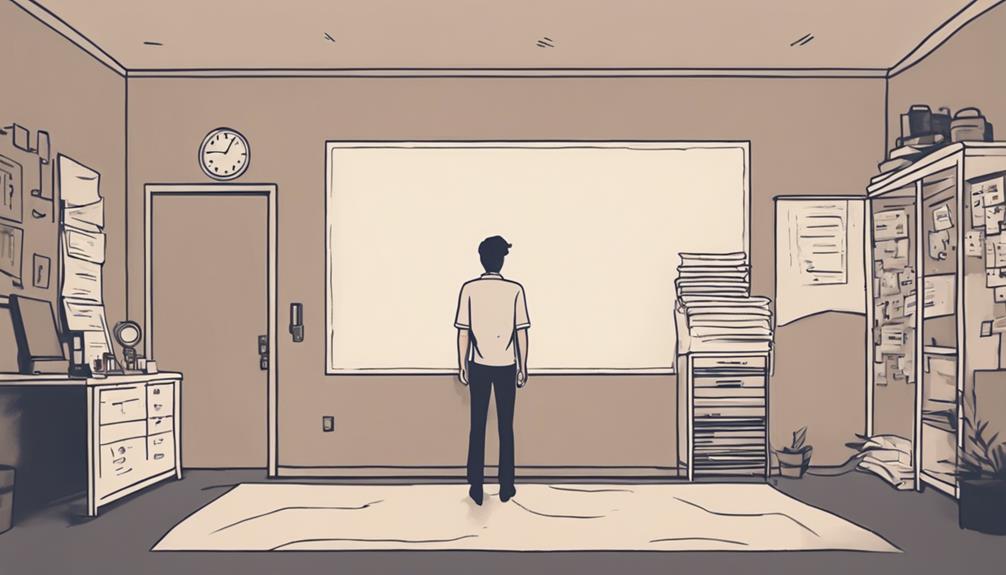
When it comes to prioritizing tasks efficiently, you'll want to focus on:
- Breaking down large tasks into manageable chunks.
- Identifying high-priority areas that need the most attention.
- Setting realistic deadlines to keep yourself on track.
Break Down Large Tasks
To prioritize tasks efficiently, break down large cleaning tasks into smaller, manageable chunks according to importance, ensuring you tackle the most critical areas first. This approach helps prevent feeling overwhelmed and allows you to focus on specific areas that need attention. By dividing tasks into smaller segments, you can allocate time and resources effectively to accomplish each task thoroughly.
Start with the most challenging or time-consuming tasks first to make the cleaning process more efficient. Breaking down tasks enables you to maintain motivation and tackle each task in a structured manner, ensuring a more systematic approach to cleaning. As you tackle each task one at a time, you'll find it easier to stay on track and make progress.
Identify High-Priority Areas
You'll want to pinpoint areas that require extra attention, focusing on high-traffic zones and surfaces that demand frequent cleaning. This will help you prioritize tasks efficiently and allocate your time wisely.
Here are some high-priority areas to focus on:
- Kitchen counters: A hub for food preparation, kitchen counters are prone to germs and bacteria. Clean them regularly to maintain a healthy environment.
- Bathroom sinks: Frequent use and moisture create an ideal breeding ground for germs. Make sure to clean bathroom sinks frequently to prevent the spread of germs.
- Entryways: High-traffic entryways require regular cleaning to remove dirt, dust, and germs brought in from outside.
- Doorknobs and light switches: These frequently touched surfaces are hotspots for germs and bacteria. Prioritize cleaning them to maintain a clean and healthy living environment.
Set Realistic Deadlines
By assigning realistic deadlines to your cleaning tasks, you'll create a sense of accountability and motivation to tackle each chore in a timely manner. This helps you prioritize efficiently, focusing on the most critical tasks first.
With achievable deadlines, you'll manage your time more effectively, ensuring you complete tasks without feeling overwhelmed. A systematic approach to cleaning is key, and deadlines help you break down the process into manageable steps.
As you set realistic deadlines, you'll find it easier to prioritize tasks based on their urgency, making the most of your time. This, in turn, reduces stress and anxiety, allowing you to stay on track with your cleaning schedule.
Allocate Realistic Timeframes
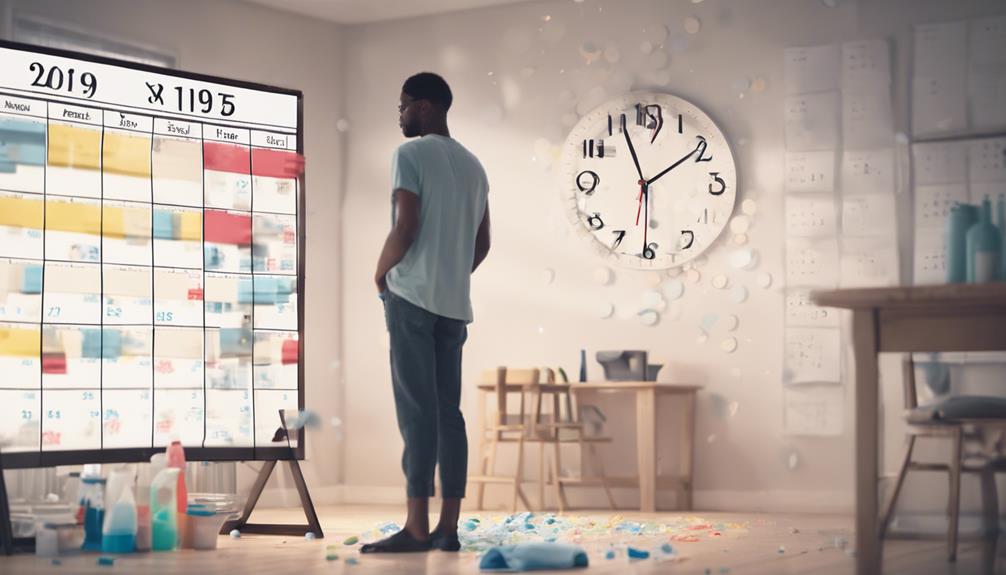
Establishing a realistic timeline for cleaning tasks is essential to maintaining efficiency and avoiding feelings of overwhelm. When you allocate specific timeframes for each task, you can prioritize and tackle them one by one, ensuring that you're making the most of your time.
Here are some tips to help you allocate realistic timeframes for your cleaning tasks:
- Break down complex tasks: Divide complex tasks into smaller, manageable segments with realistic time estimates for each.
- Avoid under/overestimation: Be honest about the time required for each task to maintain efficiency.
- Prioritize tasks: Allocate time based on the importance of each task for a more organized approach.
- Set achievable goals: Allocate realistic timeframes to prevent feelings of overwhelm or rushedness during the cleaning process.
Establish Consistent Schedules
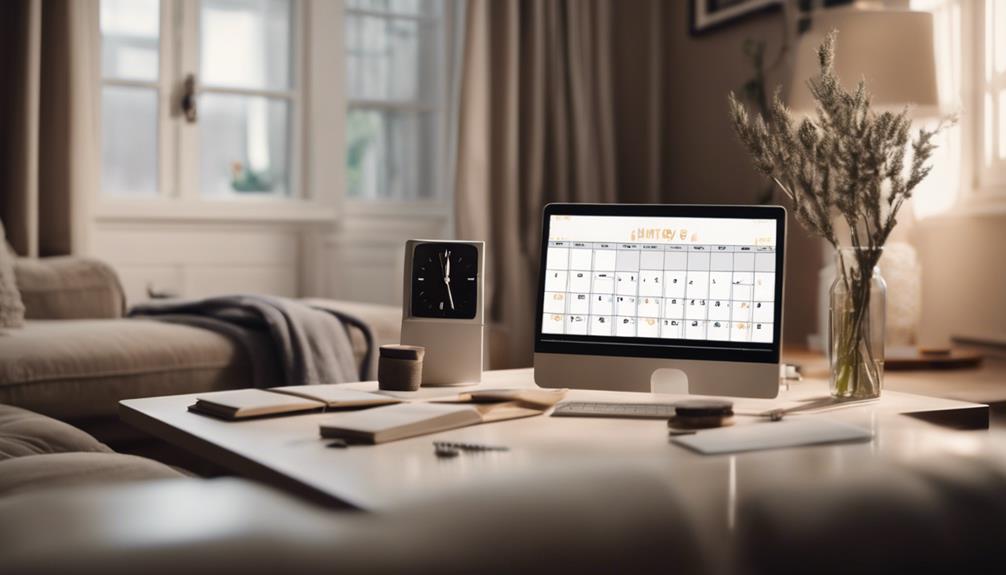
Get into a cleaning rhythm by setting specific days and times for tackling tasks, ensuring your home stays tidy without overwhelming you. A consistent cleaning schedule helps you establish routines, making it easier to maintain a tidy home without feeling stressed.
By allocating specific tasks to specific days, you'll avoid having to dedicate entire days to cleaning, reducing stress and making the process more manageable. Consistent cleaning also helps you stay on top of messes, preventing them from building up and becoming overwhelming.
By establishing a cleaning schedule, you'll create a habit of maintaining a clean living space, and you'll find that it becomes second nature to tidy up regularly. This, in turn, will reduce the need for extensive cleaning sessions, freeing up more time for you to focus on other important aspects of your life.
Delegate Tasks Wisely

When you delegate tasks wisely, you'll find that cleaning becomes a much more manageable task. By assigning household chores and prioritizing tasks based on importance and urgency, you'll be able to tackle even the most challenging cleaning tasks with ease.
Assign Household Chores
By delegating tasks wisely, you can make sure that each household member is contributing to the cleaning process in a way that plays to their strengths and preferences. This approach guarantees that everyone is working efficiently and effectively, making the cleaning process less stressful and more manageable.
To assign household chores effectively, consider the following tips:
- Assign age-appropriate chores to children, teaching them responsibility and contributing to the household.
- Delegate tasks based on individual strengths and preferences to guarantee efficient completion.
- Rotate tasks regularly to prevent boredom and distribute the workload evenly among family members.
- Use a chore chart or app to track progress and hold everyone accountable for their assigned tasks.
Task Priority Levels
How do you determine which tasks to tackle first when it comes to cleaning your home? Establishing task priority levels is essential to ensuring the most important tasks get attention first.
Identify high-priority areas that require immediate attention, such as bathrooms or kitchen surfaces. Then, distribute tasks among household members according to their abilities and time availability. This not only streamlines the cleaning process but also helps with efficient time management and reduces stress.
By setting task priority levels, you can delegate tasks wisely and achieve a more organized outcome. For instance, if you have a busy week, prioritize tasks that need immediate attention, like cleaning the kitchen counters, and delegate less pressing tasks to others. By doing so, you'll reduce stress and make the cleaning process more manageable.
Organize Essential Cleaning Tools
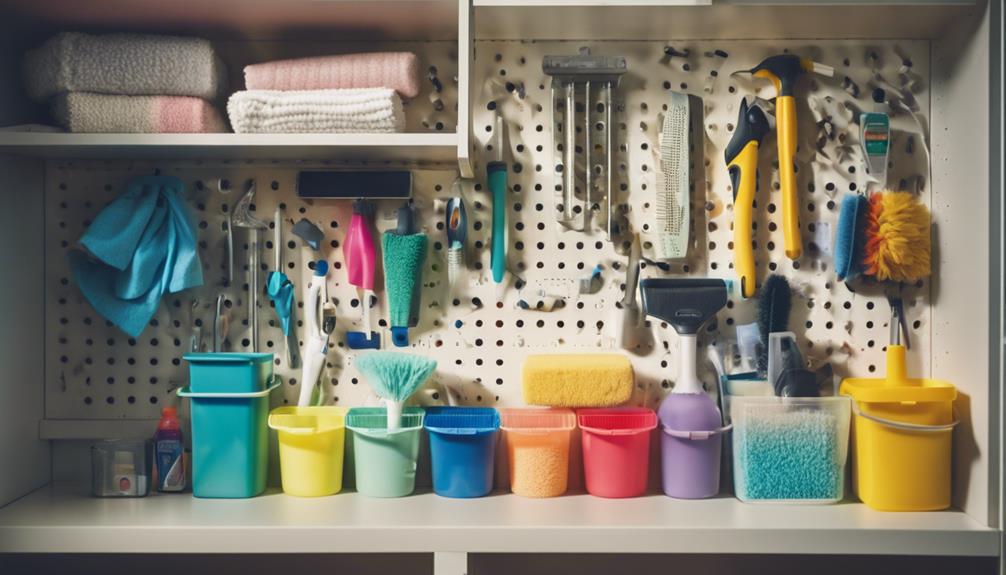
To maximize efficiency, centralize all essential cleaning tools in one designated area, making them easily accessible whenever you need them. This simple step can greatly streamline your cleaning process and save you time in the long run.
By organizing your cleaning tools, you'll be able to find what you need quickly and easily, reducing stress and making the task at hand more manageable.
Here are some tips to help you organize your essential cleaning tools:
- Categorize by type or function: Group similar tools together, such as all cleaning solutions in one area and all scrubbers in another.
- Use labeled containers: Store cleaning tools in labeled containers or compartments to keep them organized and prevent misplacement.
- Store for easy access: Place frequently used tools in easy-to-reach locations, and less frequently used tools on higher or lower shelves.
- Regularly restock supplies: Check your cleaning tools regularly and replenish supplies as needed to make sure you have everything you need to get the job done.
Declutter Your Living Space
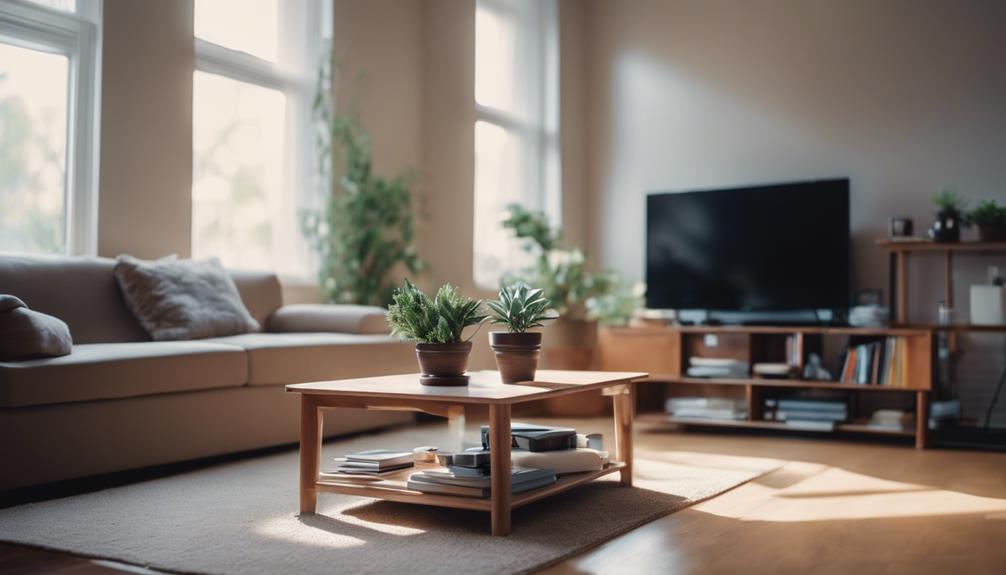
Now that you've got your cleaning tools in order, it's time to turn your attention to the space itself, and decluttering is the perfect place to start. By removing unnecessary items, you'll reduce the amount of items to clean and organize, creating a cleaner and more spacious environment. Clutter can contribute to stress and overwhelm, making cleaning more challenging. By embracing minimalism, you'll reduce the need for excessive cleaning and maintenance.
| Before | After | Benefits |
|---|---|---|
| Cluttered space | Tidy space | Reduces stress and anxiety |
| Overwhelming mess | Organized area | Saves time and energy |
| Difficult to clean | Easy to clean | Improves mental clarity |
| Stressful environment | Peaceful atmosphere | Boosts productivity |
Create a Flexible Cleaning Plan

By incorporating flexibility into your cleaning plan, you can effortlessly adapt to changing circumstances and priorities. This approach allows you to make adjustments as needed, ensuring that your cleaning schedule remains realistic and achievable.
A flexible cleaning plan is essential for accommodating unforeseen events or time constraints without causing undue stress.
Here are four benefits of having a flexible cleaning plan:
- Easily modify tasks to suit your individual needs and preferences.
- Reduce pressure by breaking tasks into manageable chunks.
- Accommodate unexpected events without derailing your entire cleaning schedule.
- Complete tasks efficiently by prioritizing tasks based on importance and urgency.
Maintain a Stress-Free Environment

As you clean, intentionally create a calming ambiance that promotes relaxation and reduces stress, allowing you to tackle tasks with a clearer mind and a more positive attitude. You can achieve this by incorporating soothing scents like lavender or eucalyptus, which have a calming effect on the mind and body.
Playing relaxing music or podcasts in the background can also enhance your mood and make the cleaning process more enjoyable.
To maintain a stress-free environment, practice mindfulness techniques such as deep breathing or visualization to stay present and focused. Implement a reward system for yourself after completing cleaning tasks to maintain motivation and create a positive association with cleaning.
Additionally, consider using green cleaning products to promote a healthier and more eco-friendly environment, reducing stress associated with harsh chemicals.
Frequently Asked Questions
How to Make Cleaning Less Overwhelming?
You can make cleaning less overwhelming by breaking tasks into smaller chunks, prioritizing what needs to be done, and allocating specific time slots, so you'll feel more in control and focused, rather than stressed.
How Can Cleaning Reduce Stress?
"Life's messy puzzle pieces fall into place as you clean, and you're the master builder. You reduce stress by eliminating clutter, creating a calming environment, and promoting a sense of control, ultimately leading to decreased anxiety and improved mental well-being."
What Are the 7 Steps in the Cleaning Process?
You're wondering what the 7 steps in the cleaning process are? Well, they include decluttering, dusting, vacuuming or sweeping, mopping, cleaning surfaces, sanitizing, and organizing – a thorough process to get your space sparkling clean!
How to Simplify Home Cleaning?
"Imagine having a sparkling clean home with minimal effort! You can simplify home cleaning by ditching clutter, creating a routine, and optimizing supplies – it's a game-changer, trust us, your sanity (and home) will thank you!"
How Can Advanced Vacuum Cleaners Simplify the Cleaning Process at Home?
Advanced vacuum cleaners for home cleaning have revolutionized the way we clean our homes. With their powerful suction and advanced technology, these machines make cleaning faster and more efficient. Their convenient features like smart sensors and automatic modes simplify the cleaning process, allowing for a cleaner and healthier home environment.
Conclusion
By now, you've got the cleaning game figured out – or so you think. You've simplified your routine, prioritized tasks, and delegated wisely. But let's be real, life gets messy (literally).
Remember, cleaning is a process, not a perfect science. Don't stress if your plan goes awry; instead, adapt, adjust, and keep on cleaning.
With these top tips, you'll be well on your way to a stress-free space that's (mostly) spotless. Happy cleaning!


